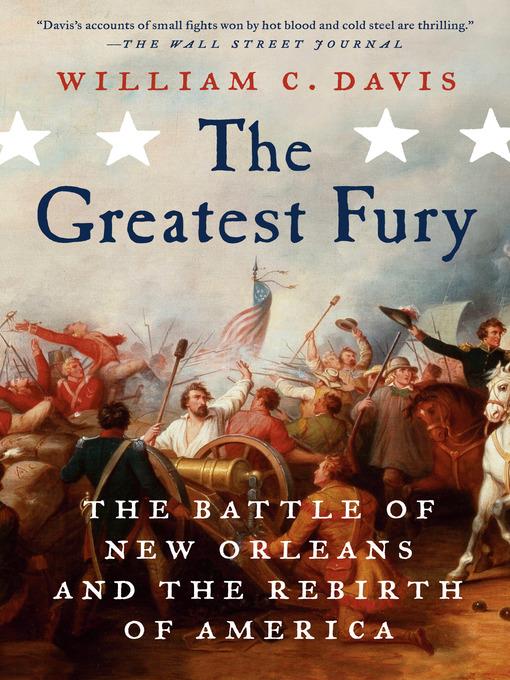
The Greatest Fury
The Battle of New Orleans and the Rebirth of America
کتاب های مرتبط
- اطلاعات
- نقد و بررسی
- دیدگاه کاربران
نقد و بررسی

July 15, 2019
Davis, a retired Virginia Tech history professor, delivers a prodigious deep dive into Andrew Jackson’s strategy and tactics of the final battle of the War of 1812. In Davis’s telling, this fight for a major American city catapulted Jackson, a “bully” and war hero “who preached democracy but showed the instincts of a dictator,” into the White House. The slowness of early-19th-century communications meant that when Jackson planned his assault on British forces creeping toward New Orleans, a gateway for exploration and commerce in the West that several nations coveted, the U.S. and Great Britain had already negotiated an end to the War of 1812. Though not a professional soldier, Jackson displayed military skills when it counted: in one pivotal confrontation with the British, he ably split his forces to attack the redcoats from the rear at night. The most riveting scenes Davis describes focus on the aspects of warfare that have changed little over the centuries: the degradations of bivouacking and dying. There’s a wealth of detail here, but not much context about the larger geopolitical situation; readers will need knowledge of the period to keep up. Early American history enthusiasts, though, will want to take a look.

August 1, 2019
A massively detailed narrative of one of the greatest victories in U.S. military history. Early in the morning of Jan. 8, 1815, Maj. Gen. Andrew Jackson was having coffee at a home in New Orleans when an artillery ball passed through the room. Grabbing his sword, Jackson looked to his staff and said "Come on--we shall have a warm day." Over the next several hours, writes historian Davis (The Rogue Republic: How Would-Be Patriots Waged the Shortest Revolution in American History, 2011, etc.), former director of the Virginia Center for Civil War Studies, Jackson led his ragtag force to a smashing victory that both secured the West for the United States and set Old Hickory on the road to the presidency. The last major engagement of the War of 1812, the Battle of New Orleans served as a showcase for Jackson's tenacity, skill, and leadership. Davis effectively depicts how Jackson overcame obstacles such as poor health, an ineffective Louisiana legislature, and a bitter feud with the governor to shrewdly build up the city's defenses, a strategy that proved wise when the anticipated British assault ended in disaster. Throughout the narrative, the author sprinkles intriguing details: One of the few Americans to die at the battle was Thomas Jefferson's nephew; Edward Pakenham, who led the British forces at New Orleans, was the Duke of Wellington's brother-in-law; the supposed lethal effectiveness of the "Kentucky riflemen" was largely a myth, as Jackson's artillery inflicted most of the damage. Unfortunately, the author also missteps. Repetitive phrases abound, and the "rebirth of America" referenced in the subtitle appears in an epilogue, which makes that part of the book feel tacked-on. Most fundamentally, the narrative is clearly aimed toward military enthusiasts and thus occasionally bogs down in descriptions of troop movements, engagements, and armaments. As is his wont, Davis delivers a highly descriptive and prodigiously researched book, but general readers should look elsewhere. A weighty military history for students and scholars.
COPYRIGHT(2019) Kirkus Reviews, ALL RIGHTS RESERVED.

September 1, 2019
In 1815, a ragtag American army commanded by Tennessee planter Andrew Jackson inflicted a devastating defeat on a larger British force attacking New Orleans. The Battle of New Orleans was the last major action of the War of 1812. Victory redeemed the United States from national disgrace--Washington had been burned by the British a mere five months earlier. Jackson was feted as a hero and his path paved to the presidency. Mirroring his persona, 19th-century Americans developed a popular image of themselves as lean, rugged frontiersmen and crack shots. Davis (history, emeritus, Virginia Tech; Crucible of Command) indulges in detail, caught up in the minutiae of who shot whom and the precise circumstances of the battle. Exhaustive endnotes conclude this staunchly traditional military history that gives shorter shrift to geopolitical and cultural context, including the rich, complex relations among blacks, whites, freedmen, Spaniards, creoles, and Anglos in the melting pot of New Orleans. The irony and the tragedy? A peace treaty had been signed two weeks before the conflict. Hundreds of men died for no tangible gain. VERDICT Extensively researched, tediously old-school military history.--Michael Rodriguez, Univ. of Connecticut, Storrs
Copyright 2019 Library Journal, LLC Used with permission.

























دیدگاه کاربران